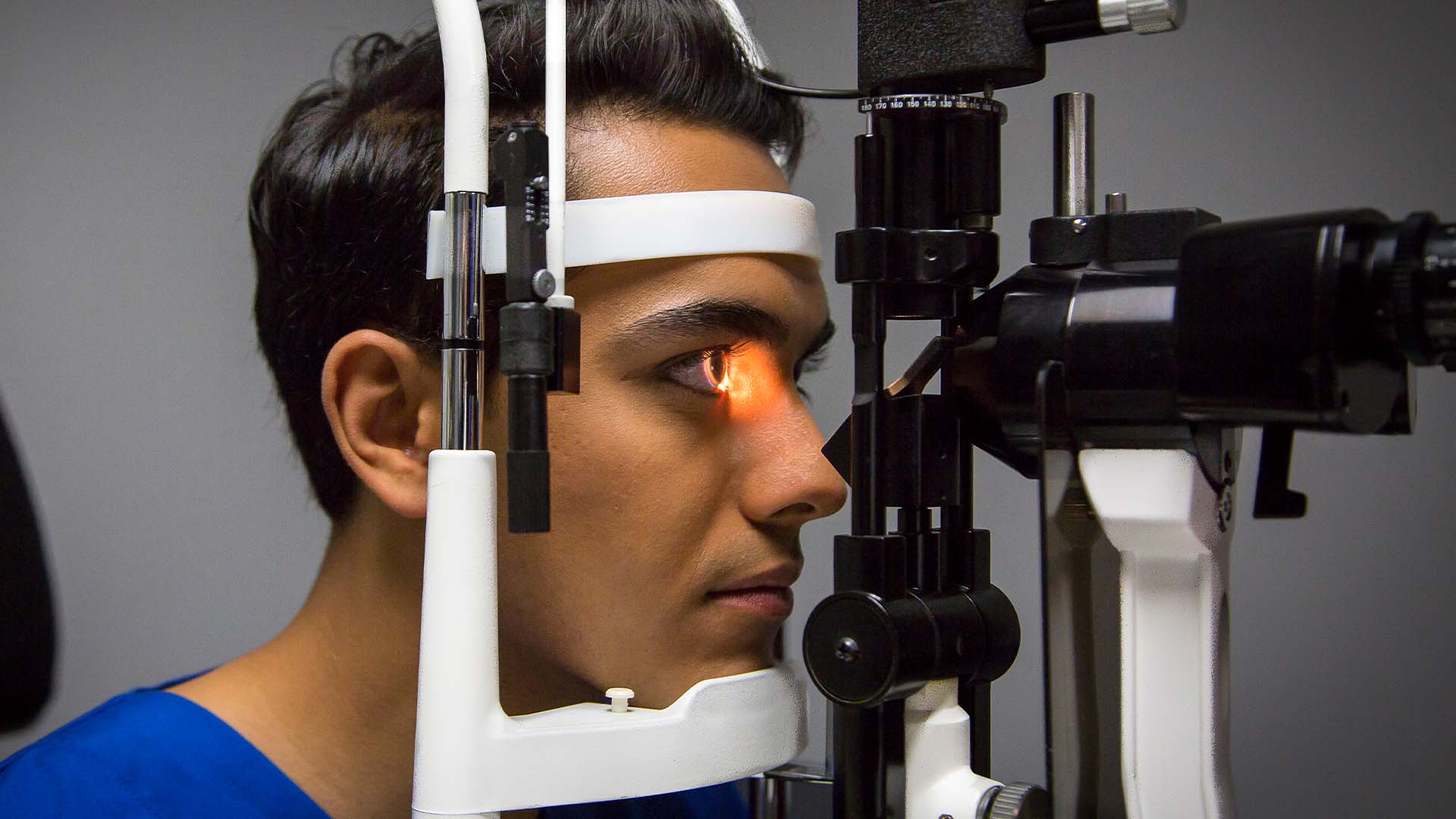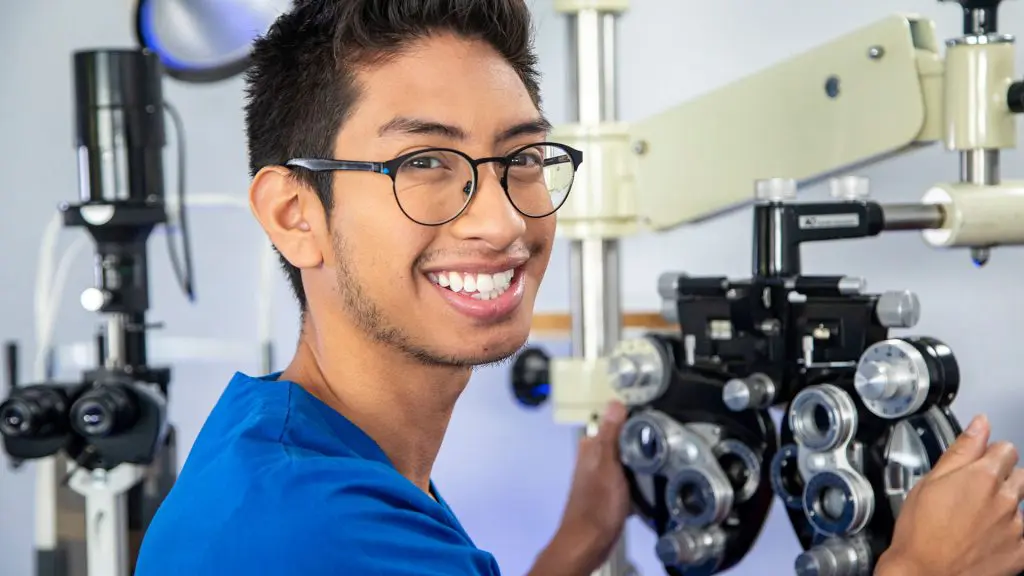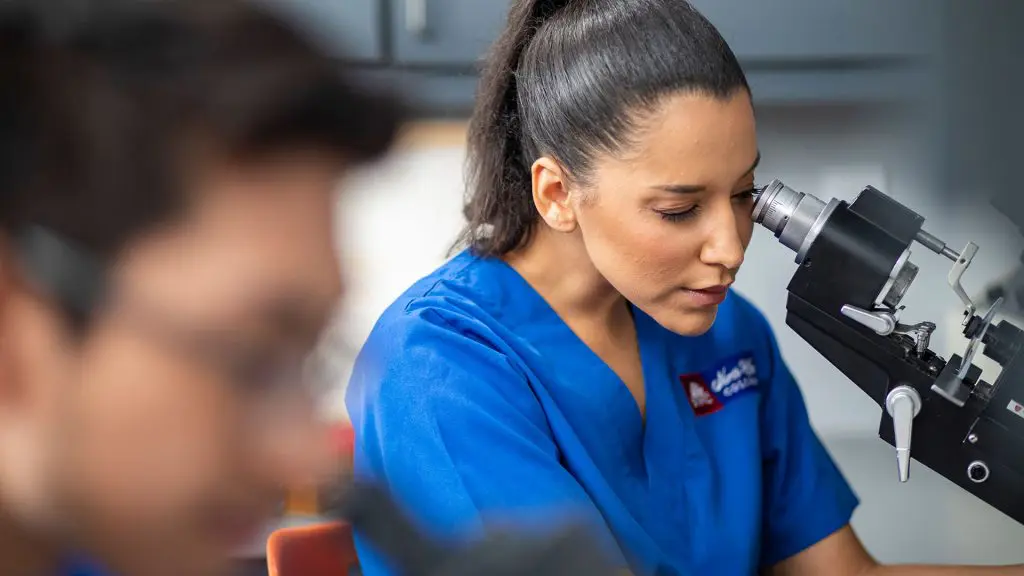Eyecare Specialist
Did you know 80% of all visual care in the United States is provided by Eyecare Specialists? This means they are a vital member of the eye health field.
Eyecare Specialists help fit eyeglasses and contact lenses, following prescriptions from ophthalmologists and optometrists. They are also commonly responsible for maintaining patient charts, obtaining patients’ histories, patient screening, selecting frames for prescription mounting and prescription verification. Additional duties may include scheduling customer appointments, administrative activities, ordering supplies and helping customers decide which eyeglass frames or contact lenses to buy.
The need for quality eye care services is growing as the older population increases and rates of certain chronic diseases that may cause vision problems rises. As a result, there are excellent opportunities in the optometric and ophthalmology fields and in the fashionable eyewear industry for trained Eyecare Specialists.

Eyecare Specialist
Eyecare Specialist Overview
The Eyecare Specialist program at North-West College is a professional health care training course designed to provide the fundamental knowledge and education needed to work as a technical assistant under a doctor’s supervision.
Eyecare Specialists routinely perform a variety of important tasks, including:
* North-West College cannot guarantee employment.
Proudly accredited, licensed to operate and/or recognized by the following institutions:


Attend Classes at a California (CA) Campus Near You!
The Eyecare Specialist program is available at the following campuses:
Meet a Graduate
Questions?
Let us help you launch your career by contacting us today. Simply fill out the form below or call us at 1-888-408-4211. Classes are starting soon!
Eyecare Specialist Careers & Work Environment
Eyecare Specialists and Opticians who work as part of a group optometry or medical practice work with optometrists and ophthalmologists to provide eye-related medical care to patients. Other common work environments include stores that sell eyeglasses, contact lenses, visual aids, and other optical goods. These stores may be stand-alone businesses or parts of larger retail establishments, such as department stores. Graduates of the Eyecare Specialist program at North-West College will be eligible to accept entry-level positions as a technician work as a technical assistant under a doctor’s supervision and are qualified to take the American Association of Opticianry examination. There are also jobs in optical laboratories, optical merchandising firms, fashion boutiques and other lens-related businesses.
Graduates of the program routinely find jobs working in:

Quick Facts about Eyecare Specialists*
Eyecare Specialist Course Material
Successful graduates of the Eyecare Specialist program are qualified to take the American Association of Opticianry examination and will be able to function as a technical assistant under a doctor’s supervision, measuring the curvature (or power) of letters of a specific size at a specific distance, recording pressure or tension within the eye, assisting in detection, determining the power of lenses in old and new prescriptions, and frame measurements. The program is divided into eight class course modules, including a 200-hour clinical externship where students will apply the skills they learn in the classroom in an actual health care practice setting.
Seminar for Success
Orientation and success building course for Career Students. Review of basic math, language, vocabulary, and writing skills. Introduction to core career classes, availability of community resources, outlining, summarizing, managing credit, and other life skills
Dispensing
Anatomy of the Eye, Care and Use of the Lensometer, Optical Terminology and Vocabulary, Transposition Practice, PD Rules and Measurements, Frame Selection and Measurement, Frame Adjustments, Use of Salt Pan and Adjustment Instruments, Ordering Prescriptions from the Lab, Bifocal Measurements and Identification, Lens Tinting and Heat Treating, Patient Education
Chairside
Optometric Services, Caring for the Office, Patient Relationships, Introduction to the Phoropter, Keratometer and Retinoscope, Taking Patient Vital Signs (Blood Pressure, etc.), Taking Patient Case Histories, Medical Emergencies, Pharmaceutical Prescriptions, Cycloplegias, Tangent Screen, Use of the Tonometer for Glaucoma Testing, Assisting with Diagnostic Testing, Employee Job Description including: Front Office Attire, Ethics, and Personal Hygiene
Contact Lens
Optics of Contact Lenses, History of Contact Lenses, Types of Lenses, Fitting and Variables in Contact Lenses, Patient Contact Lens
Front Office
Greeting Patients and Visitors, Telephone Techniques, Making Appointments, Filing, Letter Writing, Ordering Supplies, Insurance Terminology, Abbreviations, and Symbols, Insurance Coding Exercises, Processing Insurance Claims, Medical and Legal Terminology, Ethics and
Terminology & Computer Skills
Medical Terminology, Anatomy and Physiology of the Eye and terminology as it relates to the Eyecare and optometric field; Introduction to Computers, Word, Excel, Medi-Soft, Processing Electronic Insurance Claims, & Creating Professional Quality Résumés
Career Seminar
Internship Workshop, Career Readiness Workshops, New Student Orientation, and CPR
Clinical Internship
Internship to apply the knowledge and skills learned in the classroom in an
Eyecare Specialist Course Activities
The Eyecare Specialist program at North-West College is a professional health care training course designed to provide the fundamental knowledge and education needed to work as a technical assistant under a doctor’s supervision.

Eyecare Specialists routinely perform a variety of important tasks, including:
Questions?
Let us help you launch your career by contacting us today. Simply fill out the form below or call us at
1-888-408-4211
Classes are starting soon!
Request Information
Fill out a short online form and one of our Admissions Representatives will reach out and answer all of your questions.
Apply Online Now!
Ready to make your decision? You can apply online now in less than a few minutes.
Schedule a Tour
Come and see us in person! Talk to your future instructors, meet your future classmates and get familiar with your new home.


Eyecare Specialist Overview
The Eyecare Specialist program at North-West College is a professional health care training course designed to provide the fundamental knowledge and education needed to work as a technical assistant under a doctor’s supervision.
Eyecare Specialists routinely perform a variety of important tasks, including:
* North-West College cannot guarantee employment.
Proudly accredited, licensed to operate and/or recognized by the following institutions:


Attend Classes at a California (CA) Campus Near You!
The Eyecare Specialist program is available at the following campuses:
Meet a Graduate
Questions?
Let us help you launch your career by contacting us today. Simply fill out the form below or call us at 1-888-408-4211. Classes are starting soon!
Eyecare Specialist Careers & Work Environment
Eyecare Specialists and Opticians who work as part of a group optometry or medical practice work with optometrists and ophthalmologists to provide eye-related medical care to patients. Other common work environments include stores that sell eyeglasses, contact lenses, visual aids, and other optical goods. These stores may be stand-alone businesses or parts of larger retail establishments, such as department stores. Graduates of the Eyecare Specialist program at North-West College will be eligible to accept entry-level positions as a technician work as a technical assistant under a doctor’s supervision and are qualified to take the American Association of Opticianry examination. There are also jobs in optical laboratories, optical merchandising firms, fashion boutiques and other lens-related businesses.
Graduates of the program routinely find jobs working in:

Quick Facts about Eyecare Specialists*
Eyecare Specialist Course Material
Successful graduates of the Eyecare Specialist program are qualified to take the American Association of Opticianry examination and will be able to function as a technical assistant under a doctor’s supervision, measuring the curvature (or power) of letters of a specific size at a specific distance, recording pressure or tension within the eye, assisting in detection, determining the power of lenses in old and new prescriptions, and frame measurements. The program is divided into eight class course modules, including a 200-hour clinical externship where students will apply the skills they learn in the classroom in an actual health care practice setting.
Seminar for Success
Orientation and success building course for Career Students. Review of basic math, language, vocabulary, and writing skills. Introduction to core career classes, availability of community resources, outlining, summarizing, managing credit, and other life skills
Dispensing
Anatomy of the Eye, Care and Use of the Lensometer, Optical Terminology and Vocabulary, Transposition Practice, PD Rules and Measurements, Frame Selection and Measurement, Frame Adjustments, Use of Salt Pan and Adjustment Instruments, Ordering Prescriptions from the Lab, Bifocal Measurements and Identification, Lens Tinting and Heat Treating, Patient Education
Chairside
Optometric Services, Caring for the Office, Patient Relationships, Introduction to the Phoropter, Keratometer and Retinoscope, Taking Patient Vital Signs (Blood Pressure, etc.), Taking Patient Case Histories, Medical Emergencies, Pharmaceutical Prescriptions, Cycloplegias, Tangent Screen, Use of the Tonometer for Glaucoma Testing, Assisting with Diagnostic Testing, Employee Job Description including: Front Office Attire, Ethics, and Personal Hygiene
Contact Lens
Optics of Contact Lenses, History of Contact Lenses, Types of Lenses, Fitting and Variables in Contact Lenses, Patient Contact Lens
Front Office
Greeting Patients and Visitors, Telephone Techniques, Making Appointments, Filing, Letter Writing, Ordering Supplies, Insurance Terminology, Abbreviations, and Symbols, Insurance Coding Exercises, Processing Insurance Claims, Medical and Legal Terminology, Ethics and
Terminology & Computer Skills
Medical Terminology, Anatomy and Physiology of the Eye and terminology as it relates to the Eyecare and optometric field; Introduction to Computers, Word, Excel, Medi-Soft, Processing Electronic Insurance Claims, & Creating Professional Quality Résumés
Career Seminar
Internship Workshop, Career Readiness Workshops, New Student Orientation, and CPR
Clinical Internship
Internship to apply the knowledge and skills learned in the classroom in an
Eyecare Specialist Course Activities
The Eyecare Specialist program at North-West College is a professional health care training course designed to provide the fundamental knowledge and education needed to work as a technical assistant under a doctor’s supervision.

Eyecare Specialists routinely perform a variety of important tasks, including:
Questions?
Let us help you launch your career by contacting us today. Simply fill out the form below or call us at
1-888-408-4211
Classes are starting soon!
